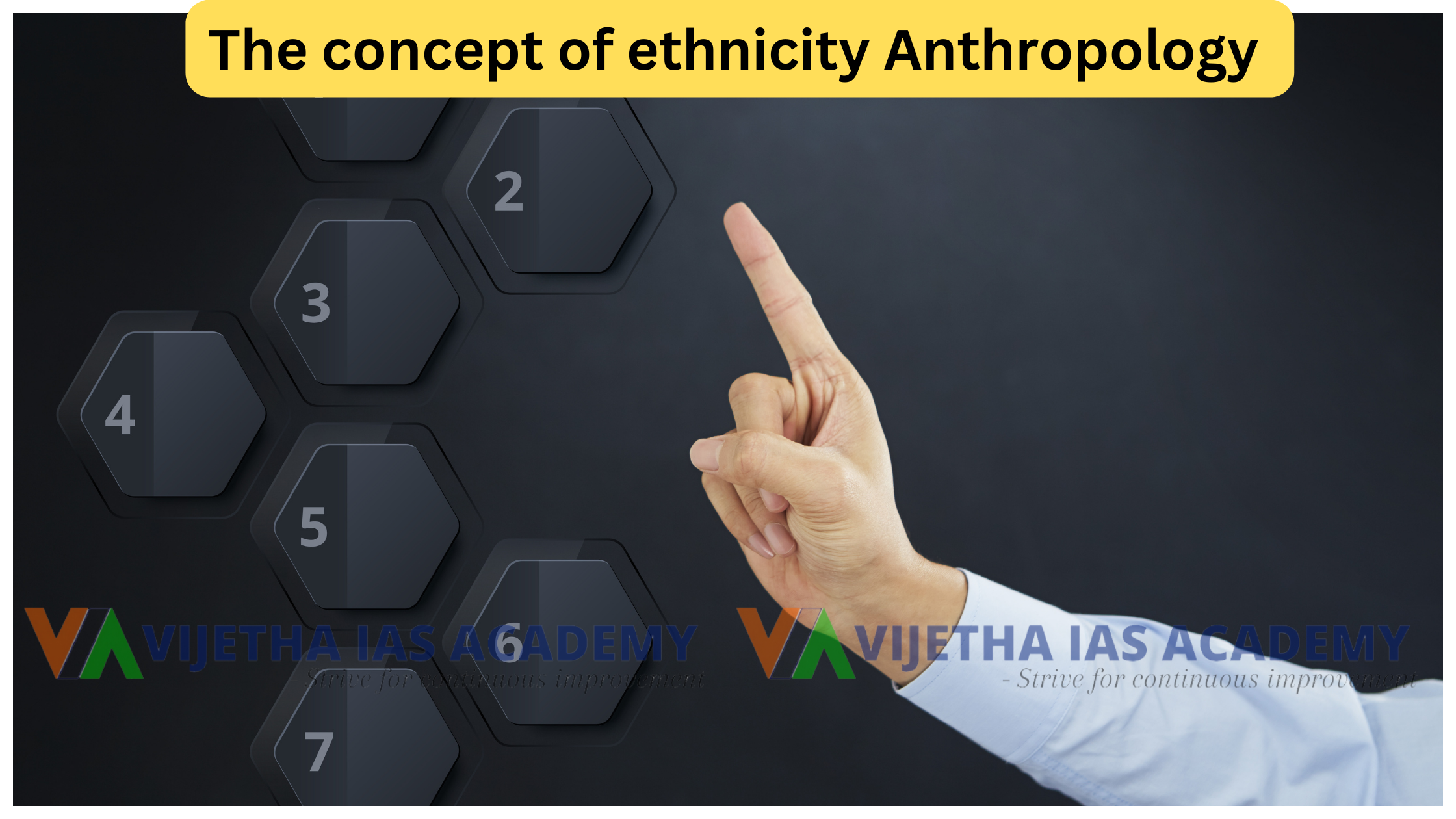
The Concept of Ethnicity: An Anthropological Perspective for UPSC Aspirants
Ethnicity is a crucial concept in anthropology, essential for understanding the complexities of human social organization, identity, and culture. For UPSC aspirants opting for Anthropology as their optional subject, a comprehensive grasp of ethnicity is vital. This article delves into the concept of ethnicity, providing insights and resources, including the esteemed Vijetha IAS Academy and the expert guidance of Kishore sir Anthropology.
Understanding Ethnicity
Definition and Characteristics
Ethnicity refers to the identification of individuals with a particular ethnic group based on shared cultural traits, ancestry, language, history, and social practices. Unlike race, which is often categorized based on physical attributes, ethnicity encompasses a broader range of cultural elements that bind a group together.
Key Characteristics of Ethnicity:
- Shared Ancestry: Common lineage or descent.
- Cultural Traditions: Unique customs, rituals, and practices.
- Language: A common language or dialect.
- Religion: Shared religious beliefs and practices.
- Geographic Origin: Association with a specific region or homeland.
- Sense of Community: Strong social ties and collective identity.
Theoretical Perspectives on Ethnicity
Primordialism
Primordialism views ethnicity as a fixed, natural, and inherent aspect of human identity. It suggests that ethnic ties are deeply rooted in historical and biological connections, making them resistant to change.
Constructivism
Constructivism posits that ethnicity is a socially constructed and dynamic phenomenon. It is shaped by historical, political, and social processes, and can evolve over time. Ethnic identities are created and maintained through social interaction and institutional practices.
Instrumentalism
Instrumentalism argues that ethnicity is a tool used by individuals and groups to achieve political, economic, or social goals. Ethnic identities can be strategically emphasized or downplayed depending on the context and objectives.
Ethnicity in India: A Complex Mosaic
India is a diverse nation with a rich tapestry of ethnic groups, each with distinct cultural identities. The country's ethnic landscape is shaped by its history, geography, and socio-political dynamics.
Major Ethnic Groups in India
- Dravidian: Predominantly in South India, characterized by languages like Tamil, Telugu, Kannada, and Malayalam.
- Indo-Aryan: Predominantly in North and Central India, with languages like Hindi, Bengali, Marathi, and Punjabi.
- Tibeto-Burman: Found in the Northeastern states, with languages like Manipuri and Bodo.
- Austroasiatic: Includes tribal groups like the Santhals and Mundas, primarily in Central and Eastern India.
Ethnic Conflicts and Integration
Ethnic diversity in India has led to both cultural richness and conflict. Issues like language, religion, and regional autonomy have often fueled ethnic tensions. However, India's democratic framework and policies promoting cultural pluralism have also fostered integration and coexistence.
Ethnicity and Identity
Ethnic Identity Formation
Ethnic identity is a multifaceted construct that develops through socialization, interaction, and self-identification. It involves both ascribed aspects (attributes assigned at birth) and achieved aspects (attributes acquired through personal effort).
Role of Symbols and Narratives
Symbols such as flags, dress, and rituals play a significant role in reinforcing ethnic identity. Narratives, including myths, legends, and historical accounts, also contribute to a sense of shared heritage and collective memory.
Ethnicity and Politics
Ethnic Politics
Ethnicity often intersects with politics, influencing power dynamics, policy-making, and resource allocation. In India, political mobilization along ethnic lines has led to the formation of ethnic parties and movements advocating for the rights and interests of specific groups.
Affirmative Action and Reservation Policies
India's affirmative action policies, including reservations in education, employment, and political representation, aim to address historical injustices faced by marginalized ethnic groups. These policies are crucial for promoting social equity and inclusion.
Ethnicity and Globalization
Impact of Globalization
Globalization has both challenged and reinforced ethnic identities. On one hand, it has facilitated cultural exchange and hybridization; on the other, it has led to the resurgence of ethnic consciousness as communities seek to preserve their distinctiveness in a globalized world.
Transnational Ethnic Networks
Diaspora communities maintain strong ethnic ties across national borders, creating transnational networks that influence identity, politics, and economics. These networks play a crucial role in the global flow of culture, ideas, and resources.
Anthropological Insights for UPSC Aspirants
For UPSC aspirants, understanding the concept of ethnicity is integral to the Anthropology Optional syllabus. It encompasses the study of ethnic groups, identity formation, and the socio-political dynamics influencing ethnic relations.
Key Areas of Study
- Theoretical Approaches: Understanding primordialism, constructivism, and instrumentalism.
- Ethnic Diversity in India: Examining the major ethnic groups and their characteristics.
- Ethnic Identity and Symbolism: Analyzing how symbols and narratives shape ethnic identities.
- Ethnic Conflicts and Integration: Studying cases of ethnic conflicts and efforts towards integration.
- Affirmative Action: Evaluating the impact of reservation policies on marginalized ethnic groups.
- Globalization and Ethnicity: Exploring the effects of globalization on ethnic identities.
Resources for Preparation
To master this subject, aspirants can utilize resources from Vijetha IAS Academy, which offers specialized courses tailored for Anthropology Optional. The academy's comprehensive study material and expert faculty, including Kishore sir Anthropology, provide invaluable support for thorough preparation.
Conclusion
The concept of ethnicity is a fundamental topic in anthropology, encompassing the complexities of identity, culture, and social organization. For UPSC aspirants, a deep understanding of ethnicity is crucial for analyzing the diverse social fabric of India and the world.
By leveraging resources like Vijetha IAS Academy and the expert guidance of Kishore sir Anthropology, aspirants can develop a nuanced perspective on ethnicity, enhancing their preparation and increasing their chances of success in the UPSC exams. This comprehensive understanding will not only aid in their academic pursuits but also equip them to contribute meaningfully to the discourse on social cohesion and cultural diversity

-1731659399186.webp)